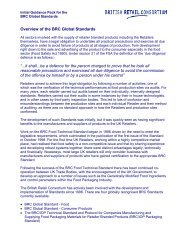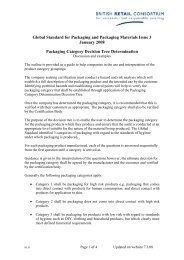Balancing Work and Family Life: enhanci - British Retail Consortium
Balancing Work and Family Life: enhanci - British Retail Consortium
Balancing Work and Family Life: enhanci - British Retail Consortium
Create successful ePaper yourself
Turn your PDF publications into a flip-book with our unique Google optimized e-Paper software.
27 August 2003JAMES HARBORNECONSUMER AND REGULATORY POLICY EXECUTIVEDIRECT LINE: 020 7854 8952FAX: 020 7 854 8901EMAIL: james.harborne@brc.org.ukThe <strong>British</strong> <strong>Retail</strong> <strong>Consortium</strong> Response to the GovernmentConsultation, ‘<strong>Balancing</strong> <strong>Work</strong> <strong>and</strong> <strong>Family</strong> <strong>Life</strong>: <strong>enhanci</strong>ng choice <strong>and</strong>support for parents’The <strong>British</strong> <strong>Retail</strong> <strong>Consortium</strong> (BRC) represents the whole range of retailers,from the large multiples <strong>and</strong> department stores through to independents,selling a wide selection of products through centre of town, out of town, rural<strong>and</strong> virtual stores.At the end of June 2002, the retail industry employed over 2.7 million people.This equates to one in nine (11%) of the total UK workforce. The industrycontinues to be one of the biggest providers of net new jobs in the economy.Employee retention is essential to retailers as it greatly affects their workplaceenvironments <strong>and</strong> therefore their productivity levels. <strong>Retail</strong>ers are very awarethat <strong>enhanci</strong>ng choice <strong>and</strong> support for parents will benefit themselves as wellas their employees.The BRC welcomes the Government’s intention to provide parents with morechoice <strong>and</strong> support to balance family <strong>and</strong> work. <strong>Retail</strong>ers acknowledge theimportance of providing a flexible working environment in which they <strong>and</strong> theiremployees can benefit. Parents especially have a necessity for balancingwork <strong>and</strong> family life, <strong>and</strong> this is recognised by the retail industry as a whole,which by its nature already provides flexible working. However, whilst it isunderst<strong>and</strong>able that the Government wish to help as much as possible tomeet better the needs of children <strong>and</strong> their parents, we would emphasize thatit is important for all employees to be able to work flexibly. <strong>Retail</strong> is a longhours,seven day week industry, where the provision to work flexibly is ofhuge importance to both employer <strong>and</strong> employee. Not only does flexibility forall improve staff retention <strong>and</strong> productivity, but also it helps create a workplaceenvironment that is free from resentment as a result of unequal provision forparents <strong>and</strong> non-parents.The BRC would like to stress that it is difficult to comment fully on much of theconsultation due that the provisions were only introduced in April of this year,therefore leaving little time to be able to assess their impact accurately. Weare pleased however that the Government is committed to reviewing the dutyto consider requests for flexible working in three years time.
Considering the case for:1. Improving the tax <strong>and</strong> NICs exemptions on employer-supportedchildcare, including how the Government could offer a better incentiveto employers to support childcare provision<strong>Retail</strong>ers are committed to helping their employees balance work <strong>and</strong> familylife, the nature of retail work itself providing many options for flexibility.Consequently, the majority or retailers are very active supporters of childcare,as they realise that this improves staff morale, retention <strong>and</strong> productivity.The BRC welcomes the Government’s emphasis on supporting good qualitychildcare. In some instances, an extension of the workplace nurseries taxexemption covering all forms of employer supported formal childcare wouldenable employers to further support good quality childcare that best meets theneeds of their employees by simplifying the requirements that employers needto meet to qualify for the exemption. For employers who do not provide ormanage nurseries, this will allow their staff to be exempt from tax on thebenefit when placing their child in formal childcare. It will also add greatflexibility to employees, allowing them to choose the form of childcare that ismost appropriate for them.We recognise that by aligning the tax <strong>and</strong> NICs treatment of employersupportedchildcare, an increase in the uptake could be achieved. It is a goodindication that the Government are strongly investing into childcare <strong>and</strong> couldmake it easier for employees to determine the benefit to them <strong>and</strong> foremployers to support childcare provision.However, the Government should make provision for staff as well asemployers to be able to find formal childcare, <strong>and</strong> present the employer withevidence of this to allow the employer to support it. This would prevent thepossible rise in employee dispute if the childcare provision arranged by theemployer did not suit certain members of their staff. It would also reduce theburden that the employer would have to undergo in finding suitable formalchildcare.Vouchers give employees flexibility to choose the type of care that suits thembest <strong>and</strong> can be used for the different types of care needed as childrenprogress through from nursery/childminder to after school <strong>and</strong> holiday care.The BRC feels there is a case for childcare vouchers receiving the sametreatment for tax <strong>and</strong> NICs as for other employer supported formal childcareprovision. It may well provide an incentive for using the childcare vouchers forformal supported childcare.However, there is a concern that removing the current childcare vouchersexemption from childcare provided by other family members that act as fulltime carers, particularly those who care for disabled children, would befinancially detrimental.
2. How well support for childcare costs within tax credits is working, inparticular the effect that the increased flexibility has on the ability ofparents to adjust their childcare requirements to suit their needsThis new provision has not been enabled long enough for the BRC to able tomake an accurate observation on how well the support for childcare costswithin tax credits is working in general. However, whilst the BRC appreciatesthat the Government is trying to limit the incentive for employees to engage insalary sacrifice, we feel that the £50 per week financial limit for formalchildcare arrangements is too low <strong>and</strong> will not provide the flexibility that theGovernment wishes. Many low earners do not pay for childcare, for a varietyof reasons such as working part-time or using family support. As such, thefinancial limit needs to be lifted to offer greater incentive to higher earnersinstead. The BRC recommends that a larger financial limit be introduced. Wewould suggest that the figure might be somewhere in the region of £100-£150,as we feel this would act as a far more effective incentive for people to returnto work <strong>and</strong> for higher earners to use formal childcare, <strong>and</strong> would enablecurrent employees to extend their hours of working. Although we appreciatethat the financial limit is designed to reduce employee detriment in regards tosalary sacrifice, the level it is set at may limit the benefit for many employees.3. Counting unpaid maternity leave as being in work for the purposes oftax credits, to enable families to continue to receive support during thisprocess<strong>Retail</strong>ers are uncertain as to the impact that this might have upon theirbusiness. The BRC would like to know whether any other employee benefitswould be affected as a result of the Government proceeding with thisproposal. We would be able to comment better on this issue after we have thisinformation.4. Allowing a mother on paid maternity leave to claim support with thechildcare costs for her new child in order to settle her child intochildcare prior to returning to workThe BRC would be in favour of this idea if the support that is suggested abovewere provided for by the Government <strong>and</strong> not by the employer. Many retailersalready offer support for employees with regards to childcare, <strong>and</strong> those whodo not are looking at ways in which they can do so. If this additional support isintended by the Government to be provided for by the employer then theincreased burden will be considerable, especially for SME retailers. Acompromise might be feasible if this was offset against existing support.
5. Allowing parents to use their full parental leave as one block at theend of maternity, paternity or adoption leaveWhilst some retailers are already looking at implementing this idea, <strong>and</strong> inprinciple retailers in general are not averse to this idea, it is difficult foremployers to comment on whether this option will be detrimental from abusiness point of view. A notice period for taking the leave as one block isessential. It would be unfair for an employer to be told with little or no noticethat an employee wished to take all parental leave in one block, as it leavesthe employer with no time to plan for covering the person’s absence. Takingparental leave in one block is easier for maternity as long-term cover isalready in place. This is not the case for a few days paternity leave, so thenotice period is even more important. Also, as it is a request, it would bepossible for the employer to reject it if there were justifiable reasons for doingso, for example if they wished to take the leave over the Christmas period.6. Allowing fathers time off to attend ante-natal careAgain, in principle, this should not be a problem, though a notice period wouldbe essential in this instance also. There might also be the problem ofabsenteeism, as at the moment there is no requirement for men to prove thatthey are attending ante-natal classes. There should also be a provision for anemployer to turn the request down in circumstances where it is not feasible forthe employee to attend the classes, for example, if they do not give enoughnotice or ask to attend them in a particularly busy time of the year.7. Extending the period of paid paternity leave <strong>and</strong>/or introduce unpaidpaternity leaveThe BRC feels that extending the period of paid paternity leave will have theobvious impact of greatly increasing costs. The two weeks provision thatexists at the moment is acceptable to retailers, but an extension of this willmean that cover has to be brought in at an extra burden to the employer. If theGovernment does decide to extend paternity leave, the consultation documentgives no idea as to what length of time the extension might apply to.Introducing unpaid paternity leave on the other h<strong>and</strong> is not an issue forretailers, as this can be given easily, <strong>and</strong> many retailers already allow theirmale employees to take unpaid paternity leave.8. Extending paid paternity leave in cases of multiple births <strong>and</strong> disabledchildrenAlthough in principle this seems acceptable, again there is the issue of whatlength of time the Government is thinking of extending this to. The cover thatwould have to be arranged whilst the father was absent from work would be abig cost, even though this provision would cover a smaller percentage of theworkforce, because the Government may well feel that fathers of multiple
irths <strong>and</strong> disabled children need a longer period of paid paternity leave thanthose who do not fall into this category. The additional time formultiple/disabled births is also too restrictive, as other difficult births can causeproblems for mother <strong>and</strong> or baby requiring additional leave for fathers. Itwould be unfair for one specific group to benefit <strong>and</strong> others not.9. The impact of the new maternity, paternity <strong>and</strong> adoption leaveprovisionsThe BRC appreciates that it is important for the Government to ascertain theimpact of the new provisions, <strong>and</strong> are encouraged as to the commitment onthis. However, the BRC feels that there is not a great deal to be gained fromcommenting on them at this moment in time, as the new maternity, paternity<strong>and</strong> adoption leave measures have only been running since April of this year<strong>and</strong> it is difficult to assess the impact of the new provisions in such a shortperiod of time. <strong>Retail</strong>ers <strong>and</strong> their employees need to have been using thenew provisions for at least 18 months, so that the employer can undertake aproper impact study. Only after this would the BRC feel comfortable inaccurately commenting on the effect of the new provisions.
















